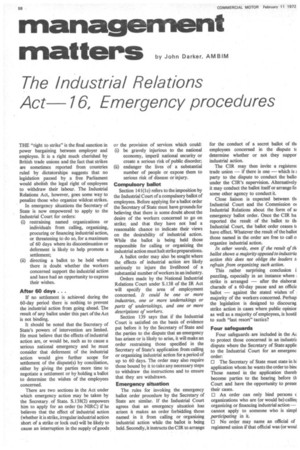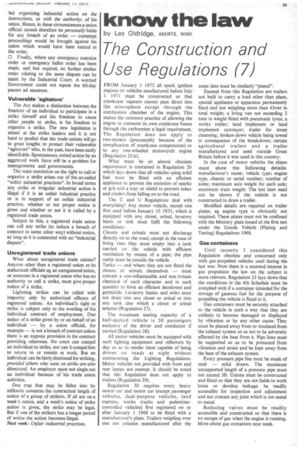management
Page 60

Page 61

If you've noticed an error in this article please click here to report it so we can fix it.
matters by John Darker, AMBIM
The Industrial Relations Act 16, Emergency procedures
THE "right to strike" is the final sanction in power bargaining between employer and employee. It is a right much cherished by British trade unions and the fact that strikes are sometimes reported from countries ruled by dictatorships suggests that no legislation passed by a free Parliament would abolish the legal right of employees to withdraw their labour. The Industrial Relations Act, however, goes some way to penalize those who organize wildcat strikes.
In emergency situations the Secretary of State is now empowered to apply to the Industrial Court for orders: (i) restraining named organizations or individuals from calling, organizing, procuring or financing industrial action, or threatening to do so, for a maximum of 60 days where its discontinuation or deferment is likely to help promote a settlement; (ii) directing a ballot to be held where there is doubt whether the workers concerned support the industrial action and have had an opportunity to express their wishes.
After 60 days. . .
If no settlement is achieved during the 60-day period there is nothing to prevent the industrial action from going ahead. The result of any ballot under this part of the Act is not binding.
It should be noted that the Secretary of State's powers of intervention are limited. He must believe that the effects of industrial action are, or would be, such as to cause a serious national emergency and he must consider that deferment of the industrial action would give further scope for settlement of the dispute(s) by conciliation, either by giving the parties more time to negotiate a settlement or by holding a ballot to determine the wishes of the employees concerned.
There are two sections in the Act under which emergency action may be taken by the Secretary of State. S.138(2) empowers him to apply for an order (to NIRC) if he believes that the effect of industrial action (whether it is strike, irregular industrial action short of a strike or lock out) will be likely to cause an interruption in the supply of goods
or the provision of services which could:
(i) be gravely injurious to the national economy, imperil national security or create a serious risk of public disorder; (ii) endanger the lives of a substantial number of people or expose them to serious risk of disease or injury.
Compulsory ballot
Section 141(1c) refers to the imposition by the Industrial Court of a compulsory ballot of employees. Before applying for a ballot order the Secretary of State must have grounds for believing that there is some doubt about the desire of the workers concerned to go on strike; and that they have not had a reasonable chance to indicate their views on the desirability of industrial action. While the ballot is being held those responsible for calling or organizing the industrial action must halt strike preparations.
A ballot order may also be sought where the effects of industrial action are likely seriously to injure the livelihood of a substantial number of workers in an industry.
Orders made by the National Industrial Relations Court under S.138 of the IR Act will specify the area of employment concerned. It could be one or more industries, one or more undertakings or parts of undertakings, and one or more descriptions of workers.
Section 139 says that if the Industrial Court is satisfied on the basis of evidence put before it by the Secretary of State and the parties to the dispute that an emergency has arisen or is likely to arise, it will make an order restraining those specified in the Secretary of State's application from calling or organizing industrial action for a period of up to 60 days. The order may also require those bound by it to take any necessary steps to withdraw the instructions and to ensure that they are withdrawn.
Emergency situation
The rules for invoking the emergency ballot order procedure by the Secretary of State are similar. If the Industrial Court agrees that an emergency situation has arisen it makes an order forbidding those named in it from calling or organizing industrial action while the ballot is being held. Secondly, it instructs the CIR to arrange for the conduct of a secret ballot of th employees concerned in the dispute t( determine whether or not they suppor industrial action.
The CIR may then invite a registerec trade union — if there is one — which is ; party to the dispute to conduct the hallo under the CIR's supervision. Alternatively it may conduct the ballot itself or arrange fo some other agency to conduct it.
Close liaison is expected between thl Industrial Court and the Commission oi Industrial Relations about the form of a; emergency ballot order. Once the CIR ha reported the result of the ballot to tit Industrial Court, the ballot order ceases t have effect. Whatever the result of the ballot those named in the order are free to call o organize industrial action.
In other words, even if the result of th ballot shows a majority opposed to industria action this does not oblige the leaders 1, refrain from organizing such action.
This rather surprising conclusion i puzzling, especially in an instance where strike is arranged — after the elaborat charade of a 60-day pause and an officiE ballot — against the stated wishes of majority of the workers concerned. Perhap the legislation is designed to discourag strike action in cases where public opinior as well as a majority of employees, is hostil to such "last resort" tactics?
Four safeguards
Four safeguards are included in the At to protect those concerned in an industri: dispute where the Secretary of State applic to the Industrial Court for an emergenc order: O The Secretary of State must state in hi application whom he wants the order to bin( Those named in the application thereh become parties to the hearing before tt Court and have the opportunity to preset their cases.
O An order can only bind persons organizations who are (or would be) callim organizing or financing industrial action — cannot apply to someone who is simpl participating in it.
O No order may name an official of registered union if that official was (or woul
be) organizing industrial action on the instructions, or with the authority, of his union. Hence, in these circumstances a union official cannot therefore be personally liable for any breach of an order — contempt proceedings would be brought against his union which would have been named in the order.
Cl Finally, where any emergency restraint order or emergency ballot order has been made, and has expired, no further similar order relating to the same dispute can be made by the Industrial Court. A worried Government could not repeat the 60-day pauses ad nauseum.
Vulnerable 'agitators'
The Act makes a distinction between the freedom of an individual to.participate in a strike himself and his freedom to cause other people to strike, ie his freedom to organize a strike. The new legislation is aimed at the strike leaders and it is not hard to predict that the trade unions will go to great lengths to protect their vulnerable "agitators" who, in the past, have been easily identifiable. Spontaneous, united action by an aggrieved work force will be a problem for managements and governments.
The main restriction on the right to call or organize a strike arises out of the so-called "unfair industrial practices". In broad terms any strike or irregular industrial action is illegal if it is an unfair industrial practice or is in support of an unfair industrial practice, whether or not proper notice is given and whether or not it is called by a registered trade union.
Subject to this, a registered trade union can call any strike (to induce a breach of contract in some other way) without notice, as long as it is connected with an "industrial dispute".
Unregistered trade unions What about unregistered trade unions? Anyone other than a registered union or its authorized officials eg an unregistered union, or someone in a registered union who has no authority to call a strike, must give proper notice of a strike.
Lightning strikes can be called with impunity only by authorized officers of registered unions. An individual's right to strike is subject only to the wording of his individual contract of employment. Due notice of a strike given by or on behalf of an individual — by a union official, for example — is not a breach of contract unless there is an express provision in the contract providing otherwise. No court can compel an individual to strike, nor can it compel him to return to or remain at work. But an individual can be fairly dismissed for striking, provided others who went on strike are also dismissed. An employer must not single out an individual because of his trade union activities.
One trap that may be fallen into by militants concerns the contractual length of notice of a group of strikers. If all are on a week's notice, and a week's notice of strike action is given, the strike may be legal. But if one of the strikers has a longer period of notice the action becomes illegal.
Next week: Unfair industrial practices.








































































































